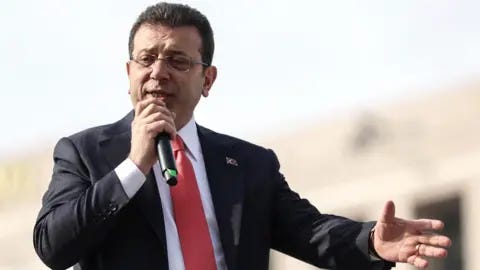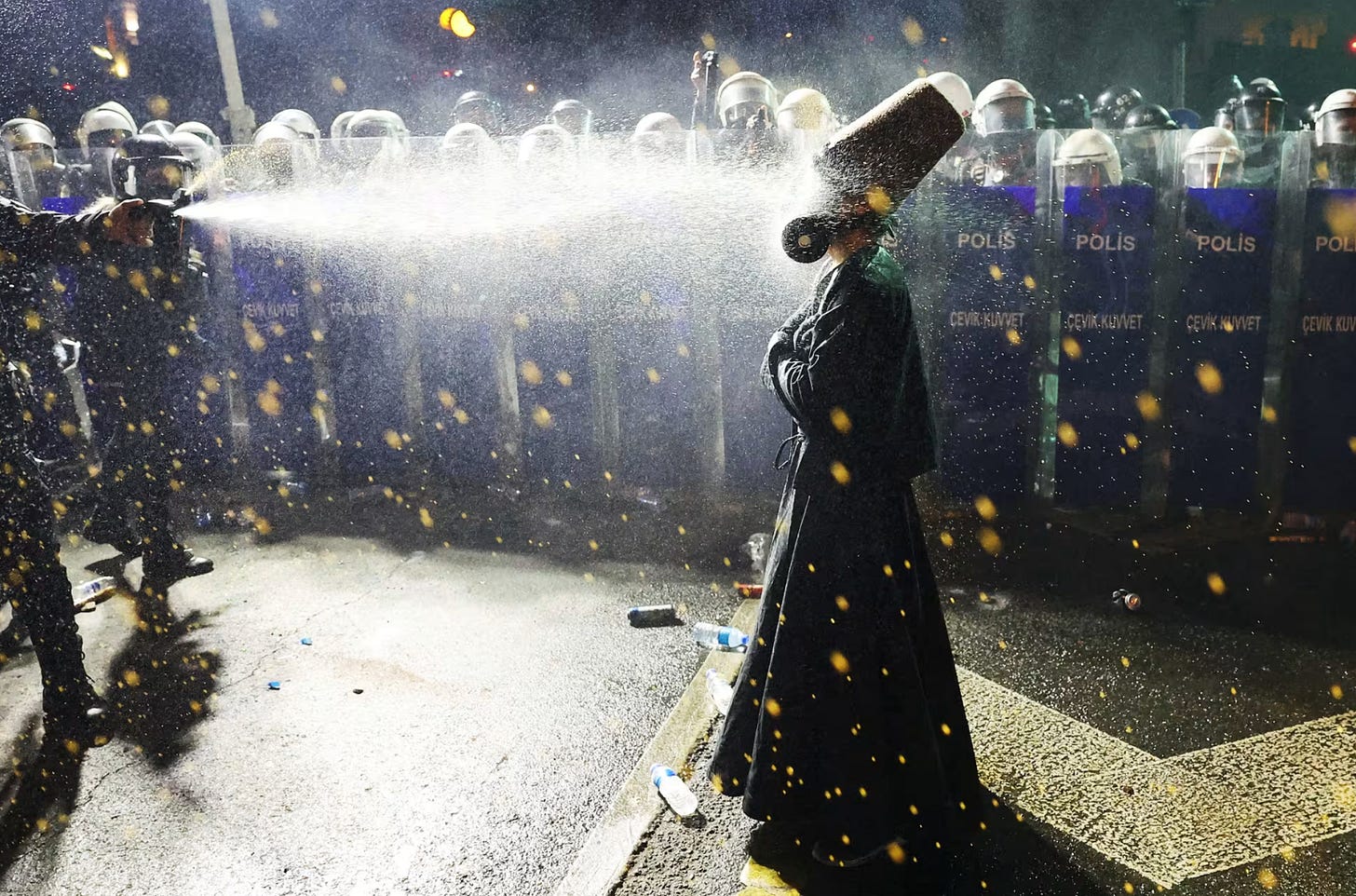What is happening in Turkey?
Erdogan is exploiting the changing geopolitical winds to secure his position at home.
Ekrem Imamoglu is the leader of the secular Republican People’s Party (CHP), Turkey’s main opposition political party. In 2019 he made a splash when he was elected Istanbul’s mayor not once but twice, after President Recep Tayyip Erdogan claimed the initial result was fraudulent. That victory ended Erdogan’s Justice and Development Party’s (AKP) 25-year stranglehold on power in Turkey’s largest city.
Ekrem Imamoglu, the leader of the CHP and Erdogan’s current bete noire

Imamoglu was re-elected in 2024 (again beating another Erdogan-backed candidate), and is a rising star in Turkish politics. He has run Istanbul effectively and built a coalition across the Turkish electorate, including with conservatives, Kurds and secular Turks. Recently polling ahead of Erdogan, Imamoglu is considered the opposition’s best chance yet to take down Turkey’s long-standing ruler.
While Turkey’s next presidential election isn’t scheduled to take place until 2028, the opposition was planning on holding a primary on Sunday, March 23 to formally nominate Imamoglu and step up the pressure on Erdogan.
But before the primary was held, optimism met reality.
Imamoglu is arrested
On March 18, Istanbul University rescinded Imamoglu’s college diploma. This may sound innocuous, but Turkish law requires presidential candidates graduate from college, so this move effectively disqualified Imamoglu from competing in the next election.
The next morning (Wed, Mar 19), the police showed up at Imamoglu’s home to take in the mayor of Istanbul. As the police were congregating outside preparing to enter, Imamoglu livestreamed a video where he vowed not to back down. “We are up against tyranny, but I will not be discouraged.”
Imamoglu was arrested for allegedly leading a criminal organization, abetting the Kurdistan Workers’ Party (PKK, a designated terrorist group), bribery, and rigging contracts for government work. Imamoglu denies the charges and claims they are politically motivated. An additional 100 members of the opposition were also arrested.
The domestic response
Conscious of the backlash Imamoglu’s arrest would cause, the authorities quickly banned public protests in Istanbul for the next four days. The government also restricted social media access, suspending opposition X/Twitter accounts. Erdogan went on TV to downplay the arrest, claiming the opposition was blowing the whole thing out of proportion. But this did little to deter Turks from gathering by the thousand to voice their discontent. A protest movement that began in Istanbul quickly spread to other major cities across Turkey, including the capital, Ankara.
Tens of thousands, primarily young people and university students, have spent weeks protesting against what they see as Erdogan’s push toward autocracy. In the words of one Istanbul protestor, “We have to stand up for the will of the people, for rights and freedom.” Since the outbreak of protests, nearly 2,000 demonstrators have been detained, including nearly a dozen journalists — one of whom (a BBC correspondent) was deported.
Protester getting sprayed by tear gas

Control of the media: In the Turkish media, there is a divide between the pro-government and opposition networks. Those that support (or are in the pocket of) the government focus on Imamoglu’s arrest and accusations, avoiding talk of the ongoing protests. Meanwhile opposition networks have been suspended for “inciting the public to hatred and hostility” by covering the protests. But as one member of Reporters Without Borders notes, Erdogan controls 85% of Turkish media, so the coverage was not exactly fair and balanced to begin with.
The primary vote
On Sunday, Mar 23, a few days after the arrest, a Turkish court formally charged Imamolgu and said he should remain imprisoned on allegations of corruption. Imamoglu declared this was a move by Erdogan to “[weaponize] the judiciary.”
That same day, despite Imamoglu’s arrest, the CHP went ahead with its plan to vote on its next presidential candidate. Rather than restrict voting to just the party’s 1.7mn members, the CHP opened up voting to anyone who wanted to participate. The response was overwhelming. Across Turkey, over 13.2mn non-party members joined to cast a ‘solidarity vote’ in support of Imamoglu, the only name on the ballot. In a show of just how enthusiastic the vote was, the 15mn primary votes cast were ~1mn more than the party received during the 2023 elections.
The economic fall-out
Since Erdogan’s most-recent presidential election in 2023, Turkey has embraced mainstream economic policies to go after soaring inflation (previously, Erdogan stood firm on low interest rates during periods of high inflation, which provided little economic help). Erdogan’s hiring of independent, technocratic economists tempered inflation and injected a bit of confidence back into Turkey’s economy, encouraging investors to return.

But the arrest of Imamoglu rocked investors, who now worry about the rule of law in Turkey and whether or not Erdogan will stick to the prescribed medicine. The Turkish Lira immediately spiked to a record low against the dollar before falling back a bit and stabilizing around 4% lower. It was subsequently revealed that the Turkish central bank spent $25bn to defend the lira and prevent a truly spiraling economic crisis.
Currency markets freaked out
Turkish equities had done well recently, building off of hopes that a possible peace in Ukraine and a more open Syria would create opportunities for Turkish companies. But in the days after Imamoglu was arrested, those gains were quickly wiped out.
The performance of the Turkish Bist 100 Index over the past three-months.
And the price of Turkish debt immediately spiked.
Bond markets spooked!

Why now?
Keep reading with a 7-day free trial
Subscribe to Nuance Matters to keep reading this post and get 7 days of free access to the full post archives.





